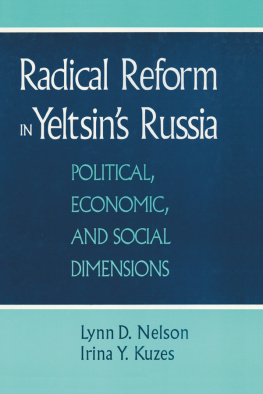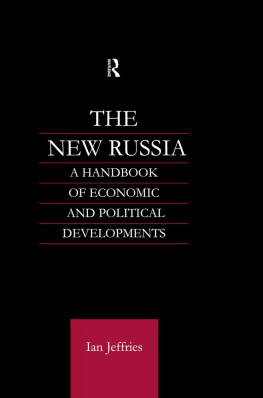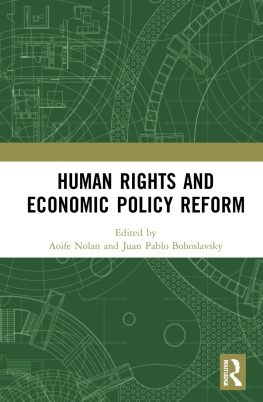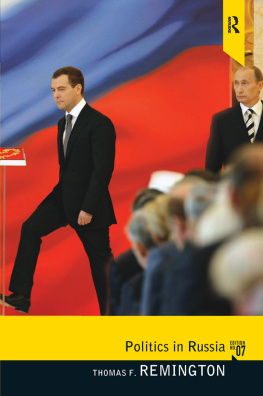Property to the People
The Struggle for Radical Economic Reform in Russia
Lynn D. Nelson
Irina Y. Kuzes
First published 1994 by M.E. Sharpe
Published 2015 by Routledge
2 Park Square, Milton Park, Abingdon, Oxon OX14 4RN
711 Third Avenue, New York, NY 10017, USA
Routledge is an imprint of the Taylor & Francis Group, an informa business
Copyright 1994 Taylor & Francis. All rights reserved.
No part of this book may be reprinted or reproduced or utilised in any form or by any electronic, mechanical, or other means, now known or hereafter invented, including photocopying and recording, or in any information storage or retrieval system, without permission in writing from the publishers.
Notices
No responsibility is assumed by the publisher for any injury and/or damage to persons or property as a matter of products liability, negligence or otherwise, or from any use of operation of any methods, products, instructions or ideas contained in the material herein.
Practitioners and researchers must always rely on their own experience and knowledge in evaluating and using any information, methods, compounds, or experiments described herein. In using such information or methods they should be mindful of their own safety and the safety of others, including parties for whom they have a professional responsibility.
Product or corporate names may be trademarks or registered trademarks, and are used only for identification and explanation without intent to infringe.
Library of Congress Cataloging-in-Publication Data
Nelson, Lynn D., 1943
Property to the people: The struggle for radical economic reform in Russia/Lynn D. Nelson and Irina Y. Kuzes.
p. cm.
Includes bibliographical references and index
ISBN 1-56324-273-7 (cloth)ISBN 1-56324-274-5 (pbk.)
1. Russia (Federation)Economic policy1991
2. PrivatizationRussia (Federation)
I. Kuzes, Irina Y.
II. Title.
HC340.12.N45 1993
338.947dc20
93-5692
CIP
ISBN 13: 9781563242748 (pbk)
ISBN 13: 9781563242731 (hbk)
To the memory of Sergei Shvedov
Our fieldwork in Russia was carried out by a staff of more than seventy capable interviewers and office workers in Moscow, Ekaterinburg, Voronezh, and Smolensk. Their exemplary participation made possible the successful completion of the research projects codirected by Lynn Nelson and Liliia Babaeva from which we draw so heavily in this book. We are especially indebted to Liliia Babaeva, who participated in designing the 1991 and 1992 projects and supervised data collection in Moscow; Rufat Babaev, general fieldwork coordinator and data-processing supervisor; our fieldwork directors outside Moscow, Sergei Khaikin in Voronezh, Svetlana Petrushina in Smolensk, and Boris Berzin in Ekaterinburg; Vladimir Meshcheriakov of the Smolensk regional administration; Eduard Yanbulatov of the Sverdlovsk Oblast property management committee; and Leonid Reznichenko and Anna Miskiniants, whose devoted work and valuable insights contributed in many ways to the 1992 project.
Several colleagues in Russia provided valuable suggestions and encouragement. Our debts to Grigorii Kaganov are numerous and varied. We also want to particularly thank Alex Levinson, Yurii Levada, and Inna Shpileva of the Center for Public Opinion and Market Research; Vladimir Yadov, Sergei Kuterin, and Olga Kryshtanovskaia of the Institute of Sociology (Russian Academy of Sciences) in Moscow; Boris Doktorov and Leonid Kesselman of the Institute of Sociology (Russian Academy of Sciences) in St. Petersburg; writer Virginie Coulloudon; Oleg Pchelintsev of the Institute of Economic Forecasting; Vadim Sadovskii of the Institute for Systems Studies; and Sergei Shvedov, who was a researcher at the Institute of Socioeconomic Problems of the Population until his untimely death in October 1992.
In the United States, Christopher Clague of the Center for Institutional Reform and the Informal Sector at the University of Maryland was a valued supporter, critic, and contract administrator. He, along with John Robinson, provided valuable suggestions at critical times for our 1992 study. Eugene Trani, president of Virginia Commonwealth University, supported this extended effort from the beginning and provided critical seed money during its initial phase. Cynthia Graves of the International Research and Exchanges Board helped facilitate Lynn Nelson's travel arrangements. Ella Kagan and Pavel Ilyin provided much-appreciated personal support. We are deeply grateful to Patricia Kolb, executive editor at M.E. Sharpe, who supported our work unreservedly and offered thoughtful insights and suggestions at just the right times. All authors should have the good fortune to work with such a talented editor!
We gratefully acknowledge research support provided by the Center for Institutional Reform and the Informal Sector (IRIS); the Internationa] Research and Exchanges Board (IREX), with funds provided by the Andrew W. Mellon Foundation, the National Endowment for the Humanities, and the U.S. Department of State; a Grants-in-Aid award for faculty from Virginia Commonwealth University; and funds from the Institute of Sociology in Moscow. None of these organizations is responsible for the views expressed in the book.
Lynn D. Nelson
Irina Y. Kuzes
For the sake of readability, we have eliminated soft signs from people's names in the narrative but have retained them in endnote citations. We have generally followed the Library of Congress transliteration system, but in many cases we began proper names that are referred to in the narrative with Ya and Yu rather than Ia and Iu. In most cases we retained ii and ia name endings.
PROPERTY TO THE PEOPLE
1
Introduction
The Gorbachev era ended with only polite notice at the end of 1991, and Boris Yeltsin's path was suddenly clear, for the moment, to radically redirect Russia's economic course. Elected president of the USSR's Russian Republic by a large margin earlier in the year, his public support had been further enhanced by his compelling challenge to the leaders of the August coup. Yeltsin's approval ratings were impressive, his backing among legislators extraordinary, and his team of advisers talented and determined to pursue rapid economic reform. Repeatedly, during the months that followed, Yeltsin's cabinet members emphasized their aim of dealing a fatal blow to the command system in the process of fashioning a market economy.
A year later, the Russian economy was on the verge of collapse according to most indicators; it appeared that Yeltsin had lost much of his public support; and the Congress of People's Deputies, which had earlier handed him broad administrative powers to pursue his program for radical reform, removed his chief economic adviser from office and was decidedly unhappy with Yeltsin as well. The following March he narrowly escaped impeachment, and in April 1993 he was fighting for his political life.
The issues that had precipitated the August 1991 coup were predominantly political. Gorbachev's opponents did not want the central command structure to be gutted by the new Union Treaty, which would have decentralized authority among the republics of the Soviet Union. It was scheduled to be signed on August 20, 1991. The coup intervened.













